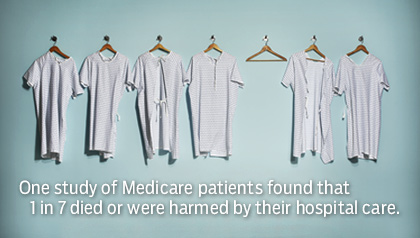My Laundry Wish List for all US Healthcare Stakeholders
By Dr. David Edward Marcinko; MBA, CMP™
As President Obama spoke, prodded and cajoled for Congress to pass HR 3200-3400 in 2008, I believe that for any healthcare reform effort to work successfully for the American people – for the long term – we need to consider the following in no particular prioritized order:
- Insurance portability uncoupled from patient employment
- Health insurance regional exchanges with inter-state purchase competition
- Doctor, drug, DME and hospital pricing and payment transparency for HSAs, and all of us
- Modifying or eliminating AMA owned CPT Codes®; a huge money maker for them
- Abandoning ala’ carte medicine for values-based outcomes
- Reduce JCAHO influence; encourage competition from Norwegian Det Norske Veritas [DNV]
- Reduce big-pharma influence thru-out the entire medical education, career and care pipeline
- End DTC advertising from big-pharma
- Promote wholesale drug purchase competition, MC bidding and generic drugs
- Encourage evidence-based medicine, not expert-based medicine
- Less pay for medical specialists with a re-evaluation of the hospitalist concept
- Advance the dying art of physical diagnosis, teach and embrace Paretto’s 80/20 rule for clinic issues
- Reduce lab test, diagnostic imaging and testing
- Encourage private 24/7/365 medical offices and clinics; and on-site and retail clinics
- Abandon P4P, medical homes and disease management ideas
- Give more economic skin-in-game to patients relative to health benchmarks
- Concretize the “never-event” prohibitions and include a list of patient health responsibilities
- More pay for primary care docs and internists
- Adopt digital records and cloud computing for patients
- Phase in true eHRs incrementally; and abandon CCHIT for open source SaaS
- Promote Health 2.0 social media.
- Augmented scope of practice, numbers and pay for NPs and DNPs, etc
- Reduce pay for CRNAs and increase it for staff RNs
- Develop step down triage and treatment units to reduce the number of full service ERs
- Increase medical, osteopathic, dental, optometric and podiatric medical school classes
- Increased practice scope for dentists, podiatrists and optometrists
- Make some sort of catastrophic HI mandatory, much like auto insurance for all
- End pre-existing conditon health insurance contract clauses
- More choice and end of life control for the terminally ill patient
- Increase marketplace competition with fewer political and financial “externalities”.
- Teach basic healthcare topics in school and encourage physical exercise
- Health and insurance education should be, but is not, the “answer” for Americans
- Protect borders and discourage undocumented illegals
- Adopt medical malpractice tort reform
- Make all stakeholders fiduciaries
- No public “option” unless you like food stamps, Section 8 housing, public transportation and schools
- Budget deficit neutrality
- Slow down!
Assessment
Recently, while in the Baltimore/Washing area, I was asked by several reporters to opine on the healthcare debate; which I did so freely having never been known as the shy type. And, regular readers will note that many of these items have been used as posts or comments on this ME-P. Unfortunately, my “laundry list” interview was pre-empted by two local but boisterous town-hall meetings with respective passionate politicians. It was redacted no doubt, but never broadcast. Thus, I missed the potential for my “five minutes” of fame. C’est la vive!
Conclusion
There you have it; direct and straight forward. And so, your thoughts and comments on this Medical Executive-Post are appreciated. Feel free to review our top-left column, and top-right sidebar materials, links, URLs and related websites, too. Then, be sure to subscribe to the ME-P. It is fast, free and secure.
Link: http://feeds.feedburner.com/HealthcareFinancialsthePostForcxos
Speaker: If you need a moderator or speaker for an upcoming event, Dr. David E. Marcinko; MBA – Publisher-in-Chief of the Executive-Post – is available for seminar or speaking engagements. Contact: MarcinkoAdvisors@msn.com
Our Other Print Books and Related Information Sources:
Practice Management: http://www.springerpub.com/prod.aspx?prod_id=23759
Physician Financial Planning: http://www.jbpub.com/catalog/0763745790
Medical Risk Management: http://www.jbpub.com/catalog/9780763733421
Healthcare Organizations: www.HealthcareFinancials.com
Health Administration Terms: www.HealthDictionarySeries.com
Physician Advisors: www.CertifiedMedicalPlanner.com
THANK YOU
Filed under: Career Development, Drugs and Pharma, Health Economics, Health Insurance, Health Law & Policy, Healthcare Finance, Information Technology, Interviews, Managed Care, Op-Editorials | Tagged: ADA, AMA, CCHIT, CPT codes, CRNAs, david marcinko, dentists, DNPs, DNV, ER, evidence based medicine, expert based medicine, Fox news, Health Insurance, healthcare reform, hospitalists, HR 3200, HR 3400, HSAs, JCAHO, malpractice reform, medicare, never-events, NPs, nurses, obama, osteopaths, P4P, podiatrists, politics, retail medical clinics, RNs, tort reform, townhall meetings | 6 Comments »
























